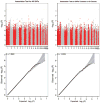Childhood intelligence is heritable, highly polygenic and associated with FNBP1L
- PMID: 23358156
- PMCID: PMC3935975
- DOI: 10.1038/mp.2012.184
Childhood intelligence is heritable, highly polygenic and associated with FNBP1L
Abstract
Intelligence in childhood, as measured by psychometric cognitive tests, is a strong predictor of many important life outcomes, including educational attainment, income, health and lifespan. Results from twin, family and adoption studies are consistent with general intelligence being highly heritable and genetically stable throughout the life course. No robustly associated genetic loci or variants for childhood intelligence have been reported. Here, we report the first genome-wide association study (GWAS) on childhood intelligence (age range 6-18 years) from 17,989 individuals in six discovery and three replication samples. Although no individual single-nucleotide polymorphisms (SNPs) were detected with genome-wide significance, we show that the aggregate effects of common SNPs explain 22-46% of phenotypic variation in childhood intelligence in the three largest cohorts (P=3.9 × 10(-15), 0.014 and 0.028). FNBP1L, previously reported to be the most significantly associated gene for adult intelligence, was also significantly associated with childhood intelligence (P=0.003). Polygenic prediction analyses resulted in a significant correlation between predictor and outcome in all replication cohorts. The proportion of childhood intelligence explained by the predictor reached 1.2% (P=6 × 10(-5)), 3.5% (P=10(-3)) and 0.5% (P=6 × 10(-5)) in three independent validation cohorts. Given the sample sizes, these genetic prediction results are consistent with expectations if the genetic architecture of childhood intelligence is like that of body mass index or height. Our study provides molecular support for the heritability and polygenic nature of childhood intelligence. Larger sample sizes will be required to detect individual variants with genome-wide significance.
Conflict of interest statement
Figures


Similar articles
-
Genome-wide association studies establish that human intelligence is highly heritable and polygenic.Mol Psychiatry. 2011 Oct;16(10):996-1005. doi: 10.1038/mp.2011.85. Epub 2011 Aug 9. Mol Psychiatry. 2011. PMID: 21826061 Free PMC article.
-
Results of a "GWAS plus:" general cognitive ability is substantially heritable and massively polygenic.PLoS One. 2014 Nov 10;9(11):e112390. doi: 10.1371/journal.pone.0112390. eCollection 2014. PLoS One. 2014. PMID: 25383866 Free PMC article.
-
A genome-wide association study for extremely high intelligence.Mol Psychiatry. 2018 May;23(5):1226-1232. doi: 10.1038/mp.2017.121. Epub 2017 Jul 4. Mol Psychiatry. 2018. PMID: 29731509 Free PMC article.
-
The new genetics of intelligence.Nat Rev Genet. 2018 Mar;19(3):148-159. doi: 10.1038/nrg.2017.104. Epub 2018 Jan 8. Nat Rev Genet. 2018. PMID: 29335645 Free PMC article. Review.
-
Research review: Polygenic methods and their application to psychiatric traits.J Child Psychol Psychiatry. 2014 Oct;55(10):1068-87. doi: 10.1111/jcpp.12295. Epub 2014 Aug 1. J Child Psychol Psychiatry. 2014. PMID: 25132410 Review.
Cited by
-
A temporal cortex cell atlas highlights gene expression dynamics during human brain maturation.Nat Genet. 2024 Nov 20. doi: 10.1038/s41588-024-01990-6. Online ahead of print. Nat Genet. 2024. PMID: 39567748
-
Benchmarking Mendelian randomization methods for causal inference using genome-wide association study summary statistics.Am J Hum Genet. 2024 Aug 8;111(8):1717-1735. doi: 10.1016/j.ajhg.2024.06.016. Epub 2024 Jul 25. Am J Hum Genet. 2024. PMID: 39059387
-
Mechanistic study of pre-eclampsia and macrophage-associated molecular networks: bioinformatics insights from multiple datasets.Front Genet. 2024 May 23;15:1376971. doi: 10.3389/fgene.2024.1376971. eCollection 2024. Front Genet. 2024. PMID: 38846957 Free PMC article.
-
Dynamics of cognitive variability with age and its genetic underpinning in NIHR BioResource Genes and Cognition cohort participants.Nat Med. 2024 Jun;30(6):1739-1748. doi: 10.1038/s41591-024-02960-5. Epub 2024 May 14. Nat Med. 2024. PMID: 38745010 Free PMC article.
-
Association of congenital heart disease and neurodevelopmental disorders: an observational and Mendelian randomization study.Ital J Pediatr. 2024 Apr 8;50(1):63. doi: 10.1186/s13052-024-01610-3. Ital J Pediatr. 2024. PMID: 38589916 Free PMC article.
References
Publication types
MeSH terms
Substances
Grants and funding
- R01 HL059367/HL/NHLBI NIH HHS/United States
- U01 DA024417/DA/NIDA NIH HHS/United States
- HHSN268201100006C/HL/NHLBI NIH HHS/United States
- HHSN268201100005I/HL/NHLBI NIH HHS/United States
- R01 MH066140/MH/NIMH NIH HHS/United States
- HHSN268201100007I/HL/NHLBI NIH HHS/United States
- R01 HL087641/HL/NHLBI NIH HHS/United States
- R37 DA005147/DA/NIDA NIH HHS/United States
- U01 HG004399/HG/NHGRI NIH HHS/United States
- HHSN268201100012C/HL/NHLBI NIH HHS/United States
- UL1RR025005/RR/NCRR NIH HHS/United States
- R01 DA005147/DA/NIDA NIH HHS/United States
- HHSN268201100009I/HL/NHLBI NIH HHS/United States
- R37 AA009367/AA/NIAAA NIH HHS/United States
- R01 DK058845/DK/NIDDK NIH HHS/United States
- R25 DA026119/DA/NIDA NIH HHS/United States
- U01 HG004446/HG/NHGRI NIH HHS/United States
- U01HG004424/HG/NHGRI NIH HHS/United States
- R01HL59367/HL/NHLBI NIH HHS/United States
- HHSN268201100010C/HL/NHLBI NIH HHS/United States
- UL1 RR025005/RR/NCRR NIH HHS/United States
- R01 AA009367/AA/NIAAA NIH HHS/United States
- P01 CA087969/CA/NCI NIH HHS/United States
- HHSN268201100008C/HL/NHLBI NIH HHS/United States
- HHSN268201100005G/HL/NHLBI NIH HHS/United States
- HHSN268201100008I/HL/NHLBI NIH HHS/United States
- HHSN268201100007C/HL/NHLBI NIH HHS/United States
- P01 CA055075/CA/NCI NIH HHS/United States
- 092731/Wellcome Trust/United Kingdom
- R01 AA011886/AA/NIAAA NIH HHS/United States
- HHSN268201100011I/HL/NHLBI NIH HHS/United States
- HHSN268201100011C/HL/NHLBI NIH HHS/United States
- R01 HL086694/HL/NHLBI NIH HHS/United States
- DK58845/DK/NIDDK NIH HHS/United States
- MC_UU_12013/1/MRC_/Medical Research Council/United Kingdom
- CA87969/CA/NCI NIH HHS/United States
- ETM/55/CSO_/Chief Scientist Office/United Kingdom
- G0700704/MRC_/Medical Research Council/United Kingdom
- U01 HG004424/HG/NHGRI NIH HHS/United States
- U01HG004399/HG/NHGRI NIH HHS/United States
- G0500079/MRC_/Medical Research Council/United Kingdom
- U01 HG004402/HG/NHGRI NIH HHS/United States
- CA55075/CA/NCI NIH HHS/United States
- U01HG004402/HG/NHGRI NIH HHS/United States
- MC_PC_15018/MRC_/Medical Research Council/United Kingdom
- R01 HD050735/HD/NICHD NIH HHS/United States
- R01HL087641/HL/NHLBI NIH HHS/United States
- HHSN268201100009C/HL/NHLBI NIH HHS/United States
- HHSN268201100005C/HL/NHLBI NIH HHS/United States
- G9815508/MRC_/Medical Research Council/United Kingdom
- CZB/4/505/CSO_/Chief Scientist Office/United Kingdom
- BB/F019394/1/BB_/Biotechnology and Biological Sciences Research Council/United Kingdom
- R01HL086694/HL/NHLBI NIH HHS/United States
- R01 DA013240/DA/NIDA NIH HHS/United States
- MR/K026992/1/MRC_/Medical Research Council/United Kingdom
LinkOut - more resources
Full Text Sources
Other Literature Sources


